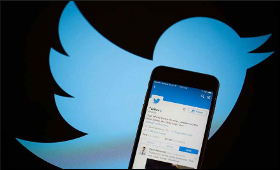|
|
|

|
How Twitter contributes to 'social jet lag'
|
|

|
|
| Top Stories |
 |
|
|
|
IANS | 16 Nov, 2018
People's social media usage, which largely mirrors daily work schedules
and school calendars, is causing a huge amount of "social jet lag" and
disrupting their biological clocks, reveals a study that analysed
patterns of activity on the social media platform Twitter.
Social
jet lag -- a syndrome related to the mismatch between the body's
internal clock and the realities of our daily schedules -- has
previously been tied to health problems.
The researchers found
that sustained periods of low Twitter activity were correlated with
sleep patterns, while the nightly lull in Twitter activity shifted to
later times on weekends relative to weekdays -- an indication of social
jet lag.
The magnitude of this "Twitter social jet lag" varied
seasonally and geographically. It was also correlated with average
commuting schedules, including how many people do shift work, and
disease risk factors such as obesity.
"When we look at how social
jet lag changes throughout the year, we find that the dominant effect
by far is the social calendar," said Michael Rust from The University of
Chicago.
"It suggests that humans in modern societies have
biological rhythms that are somewhat disconnected from the changing
hours of sunlight throughout the year," he added.
Previously,
researchers have measured social jet lag by surveying for differences in
wake and sleep times between weekdays and weekends and by using
specialised activity monitors.
In the new study, reported in the
journal Current Biology, the team collected readily available Twitter
data for more than 1,500 US counties throughout the 2012-2013 calendar
years in 15-minute intervals.
Those geographically tagged tweets represented about 2,40,000 people.
Most
counties experienced the largest amount of Twitter social jet lag in
February and the lowest in June or July. The evidence is consistent with
the notion that those patterns are driven primarily by social
pressures, including shifting school schedules, and less so by the
direct seasonal effect of altered day length.
"This is consistent
with some studies that suggest that the effect of the sun on our lives
may be getting weaker over time, perhaps as we spend more time indoors
looking at our phones," Rust said.
|
|
|
| |
|
|
|
|
|
|
|
|
|
|
|
|
|
|
| |
| Customs Exchange Rates |
| Currency |
Import |
Export |
US Dollar
|
66.20
|
64.50 |
UK Pound
|
87.50
|
84.65 |
Euro
|
78.25
|
75.65 |
| Japanese
Yen |
58.85 |
56.85 |
| As on 13 Aug, 2022 |
|
|
| Daily Poll |
 |
 |
| PM Modi's recent US visit to redefine India-US bilateral relations |
|
|
|
|
|
| Commented Stories |
 |
|
|
|
|
|
| |
|